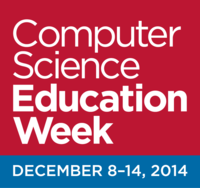Coinciding with the launch of Computer Science Education Week, the Obama Administration is ramping up support for computer science training initiatives across the country. A public-private partnership between Code.org and the National Science Foundation is expanding K-12 access to computer science and coding.
Central to the initiative, the nation’s seven largest school districts plus more than 50 others will be making introductory computer science available to all their students, a cohort of over 4 million students in more than 1,000 high schools and middle schools.
The effort is lauded by grassroots organizers who have been fighting to gain national attention and funding for this critical yet under-represented piece of the American educational curriculum. According to figures released by the White House, more than 50 percent of STEM jobs are projected to be in computer science-related fields by the year 2020. Another major goal is attracting greater numbers of women and minorities into the computer science arena. Outreach strategies include a computer science classroom design prize and the emphasize of role models such as Navy Real Admiral Grace Hopper, the ENIAC programmers, NASA’s Katherine Johnson, and other luminaries.
While some of the big seven – New York, Los Angeles, Chicago, Miami, Las Vegas, Houston and Fort Lauderdale, Fla. – already offer some kind of computer training, all 60 district partners have pledged to standardize their coursework.
The Seattle-based non-profit and founding partner of Computer Science Education Week, Code.org has signed on to provide the curriculum, professional development, and other support. Code.org is also responsible for the Hour of Code campaign that is in full-swing this week. Launched last year, the program has brought computer science education to 50 million students, 40 percent of whom are girls.
The K-12 computer science education initiative has attracted charitable contributions totalling $20 million from Google, Microsoft, Bill Gates, and other companies and philanthropic groups, which will make it possible to train 10,000 teachers for fall 2015 and another 25,000 instructors in time for the fall 2016 school year. It will also establish an Advanced Placement (AP) Computer Science course that focuses on the creative side of computing through the deployment of real-world applications.
In an official White House video, President Obama shared a few words of advice with the budding computer scientists across the country:
“While no one is born a computer scientist,” said the President, “becoming a computer scientist isn’t as scary as it sounds. With hard work, and a little math and science, anyone can do it.”
“Don’t just consume things, create things,” President Obama counseled. “Take an hour to learn more about the technology that touches every part of our lives. That’s how you can prepare yourself for the skills you need for your future. And that’s how you can help our country prepare for the future as well.”



























































